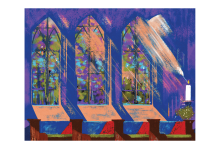Living the Word

WE HAVE COME through a turbulent year in which health concerns, weather concerns, social unrest concerns, and more have been at the center of our thoughts. From the first time we heard “COVID-19” to the last storm of hurricane season to the deaths of many significant cultural icons in the U.S., we have found ourselves reeling—or at least I have, and so have many people I know.
Advent and the beginning of the Christmas season give us an opportunity to recalibrate and take a breath. We are into the new Christian calendar, and for Christians that reality should mean something. Expectation, hope, joy, and peace are just some of the Christian ways of leaning into life. Advent allows us to flex those faith muscles. And we need them, because, as the texts for the first days of Christmastide notes, the struggle under which we live does not dissipate. We live our Christian faith most often amid social crises. “Calm” and “peace” are aspirational at best. The reflections for this month try to make sense of how we flex those muscles I mentioned earlier. How do we participate in God’s desire for us to live together in just, holy, equitable ways? How do we hold ourselves and each other accountable to building the commonwealth of God, in which we each play our part, great or small, so that all are made whole?

AS WE COME to the end of the Christian liturgical year to enter Advent, these reflections are more on the character of God than on our human responsibilities to live into God’s reign. They evoke a sense of God’s care for God’s people as a continual reality from generation to generation.
What does it mean to reflect on the ways God has been with our ancestors and bring that reflection into our trust for God? How do we hold ourselves accountable to our history while reaching toward God’s future? If we believe that we are participants in the reconciliation of the world to wholeness, to God’s first and best intentions, then we will have to recommit ourselves to the promises we made to serve God.
It’s not always easy because there are so many other things, other “gods” if you will, to pull us away. The hymn writer confessed that he was “prone to wander, Lord I feel it.” Haven’t we all felt the inclination to leave the God of our ancestors, of our confession, of our hope? I certainly have. As we meditate over the texts for this month, I hope we also will reconsider our relationship with God and with one another. I hope we will be encouraged as we decide when and how to act as a part of our faith. The world needs us to be reflective and active in these times. God is calling us forward.
FOLLOWING JESUS IS a mindset, a way of thinking as much as a way of being. In fact, one is not able to “be” a Christian without having a “change of mind,” a metanoia, the Greek word used in the New Testament for “repentance.” This change of mind or repentance, however, does not come from debates or argument. Rather, becoming like Christ is trying to figure out what it means to be one of his followers. “Lord, I want to be a Christian in my heart,” says the “Negro” spiritual. Depending on the version, the songwriter chooses to “be more loving,” “be more holy,” and “be like Jesus” for the verses that follow.
It may be fitting that we do not know who wrote this song or where it originates, except from the hardscrabble lives of enslaved people in the U.S. Imagine with me what it might have been like to sing these words under such suffering and brutal conditions in order to uphold a horrific system. But instead of reflecting passive acceptance, these words might have been a means to shore up enslaved persons’ souls so they could live antithetically to that system. It certainly works that way for me, in the face of death-dealing encounters and events. This month’s texts give us an opportunity to not only sing this song, but to meditate on it and do our best to practice it. Maybe we will become more Christian in our hearts and in our actions. We will have to want it.
October 4
Sharing in the Suffering
Exodus 20:1-4, 7-9, 12-20; Psalm 19; Philippians 3:4-14; Matthew 21:33-46
WHAT DOES IT mean to share in Christ’s suffering? I’ve bandied this question around in my mind for some time as I have pondered the Philippians text. Paul, of course, had shared in persecuting early believers before he became a convert himself. Trying to make sense and meaning of that suffering and people’s losses must have been a constant project for those trying to encourage the early church. Here, Paul takes on what it has meant to “lose everything.” His pedigree is impeccable; his credentials unassailable; his attendance to the law, meticulous. And yet, none of that matters to him after he committed to “knowing Christ Jesus” (verse 8). Those things—status and power—are on the trash heap as far as he is concerned. But what comes in its stead is suffering, even as he longs to “know Christ and the power of his resurrection” (verse 10). For Paul, you can’t get to the power of the resurrection without sharing in Christ’s suffering. But what does that mean?

EACH OF THESE reflections was written separately, not taking the others into consideration while writing each one. But as I reread them, there is a thread here. It is the thread of what it means to live faithfully together; what it means to do right by one another. Reflecting on love, accountability, economic justice, and what it means to have a righteous mind, I found myself thinking of each text in communal ways, rather than the ways I confess to typically having thought of them: “What do they mean for me, the individual?”
I am more struck by the selfishness I see, in these extraordinary times, when some people flat out refuse to do anything that they believe infringes on their individual rights. I believe that as followers of Jesus we are charged—called—to go beyond ourselves, even if we are socialized differently in our cultures or families. In addition, it is easy to settle into devotions that do not look beyond our own spiritual growth. But in these reflections, I have pushed myself to think about what it means to take in a larger view, to extend personal spiritual growth into the community. In some ways I am trying to reflect the Zulu concept of ubuntu, which indicates that a person is only human in relation to other humans. For me, by necessity, that means we must reach beyond ourselves. I hope these reflections will take you to that kind of humanity which, I believe, will deepen your faith in Christ.
September 6
The Love Debt
Exodus 12:1-14; Psalm 149; Romans 13:8-14; Matthew 18:15-20
“LOVE” IS A landmine word. It has come to mean expressions of sappy, gooey sentimentality. Because of this expectation, requiring the hard “verb” of love as a Christian commitment often gets dismissed. “Owe no one anything, except to love one another, for the one who loves another has fulfilled the law” (Romans 13:8). Every bit of the Romans text requires something more than good feelings. It calls us to examine our Christian debt. To “do no wrong” in a world where wrong stalks so many means we have to figure out how to “right the wrong.” What can it mean to “owe no one anything but love” when this nation robbed Indigenous Peoples of land and livelihood? It would be easy to say, “That was so long ago,” except the effects of that robbery extend into our present time.
It’s easy enough to name the damage, but how do we repair it? What does it mean to say, “Love does no wrong to a neighbor” (verse 10), when our trans siblings are being murdered and dismembered (as in the case of Dominique Fells in Philadelphia)? How do we provide safety? What does “Love your neighbor as yourself” (verse 9) mean in this Black Lives Matter moment of our culture, as we grapple with centuries-old sin against Black humanity? If we in fact owe one another love, then we owe one another justice, which includes repairing the damages done, individually and collectively, in community. It literally means reparation. It means doing so with an urgency, if we in fact believe “salvation is nearer to us now than when we became believers” (verse 11). For some, longing for Christ’s return can be an invitation to ignore the pain of now; but for me, it is the exact opposite. We are called to live honorably, which means to love righteously by “putting Christ on” (verse 14) and being the active love of God in the world by our deeds. Otherwise, it is not love.

RECOUNTING THE STORIES that shape our religious longings happens in the shade of uncertainty and fear. We remain in “Ordinary Time” but are besieged by a global pandemic with fallout the likes of which we cannot yet know. It would be easy to scapegoat people or to descend into fear. But we are called to live out our faith, even in difficult times—or maybe especially in difficult times.
We know we are constantly being shaped by our histories, in every way. Telling the stories of how we’ve come through in the past and grounding ourselves again in the firm foundation of our faith will, over time, reveal to us how that foundation shaped our lives in this season. It may embolden us to join God’s project of salvation, deliverance, and freedom for all creation. With Christ at the center of our lives, we have a constant invitation to return to the source and to center our lives in God in such a way that we see our responsibility to live, on behalf of this world, in the name of Christ. It pushes us beyond our circles of family and friends and helps us to see a larger connection, deeper relationships. Perhaps if we can get there, we will be able to see our need to repent from our self-absorption. We might be able to see that we are a web of relationships and—just as Moses needed the help of at least five women—that we need one another to survive.
August 2
Wrestling a Blessing
Genesis 32:22-31; Psalm 17:1-7, 15; Romans 9:1-5; Matthew 14:13-21
IN GENESIS 32, Jacob wrestles a blessing from the man at the river Jabbok, but not without cost. Jacob says he’s seen God face to face (32:30), something Moses would later be told is impossible. There has been much scholarship on whether the man with whom Jacob wrestles is God or an angel. The text is fully ambiguous. But it seems clear that Jacob wrestled in the night because he was afraid to face his past. He feared the coming confrontation with Esau.
I have had internal wrestling matches that have felt like I was in hand-to-hand combat with myself. Lately, I’ve been wondering whether our nation can wrestle with its internal beginnings, with its demons and angels—with its past. Recent events where Black people have died either in vigilante killings, such as Ahmaud Arbery in Georgia, or state-sanctioned police killings, such as the murders of Breonna Taylor and George Floyd, tell me we still have some communal wrestling to do, in hopes of finding a new name that includes “justice.” Jacob needed to win because from his lineage would come the patriarch from whom came the messiah who “God blessed forever” (Romans 9:5). If people will know God’s blessings, they must find a way to live into what is right for the sake of us all.

ORDINARY TIME RARELY is. These texts in July fall in “ordinary” time on the Christian liturgical calendar, that time after the holy days of Lent, Easter, and Pentecost. I often think about the irony of this time being designated “ordinary,” since rarely is it ordinary or mundane. There usually is something going on in the world that demands our attention or causes us concern. Certainly, that is true in this season of the coronavirus. So “ordinary,” as we know it, is hardly an apt term.
The term “ordinary,” which comes from the “ordinal” numerals by which the weeks are counted, reflects that we are not in the season of “high holy” days, except for an occasional recognition of a saint or significant moment in history for the church writ large. Ordinary time is just under half of the Sundays on the calendar. It is the time when Christians recount the stories of their faith, across the biblical canon, in order to strengthen their commitments to discipleship and to study and reflect on what it means to be the people of God, both in one’s own life and in the community’s formation.
These Sundays in July capture the day-to-day nature of our faith. The parables in Matthew give us glimpses of God’s reign, tantalizing us. Paul’s letters remind us that sometimes we really struggle to become who God created us to be. The texts call us into curiosity, into covenant, into commitment, and into community. It is an extraordinary challenge.
July 5
Discerning Our Way
Genesis 24:34-38, 42-49, 58-67; Psalm 45:10-17; Romans 7:15-25; Matthew 11:16-19, 25-30
AT FIRST BLUSH, the Hebrew Bible texts for this week are all about finding and celebrating one’s mate for life. Abraham’s servant (Genesis 24:34) goes to find a wife for Isaac among Abraham’s kindred. Since the servant doesn’t know who they are, he must come to some way to discern. How will he know? He prays for success. He prays that the woman he finds will be willing to leave her family. And, like the bride in Psalm 45, Rebekah does indeed return with him. Here we read the end of the trip, but Genesis 24 begins with the servant’s angst about how to know.
How to know. These stories show us at least one way to know: Pray and look for signs. But looking for signs does not always work. Maybe it worked here because the servant did not ask for himself, but for Abraham’s sake. Maybe were he looking for himself, his own desires might get in the way. Perhaps that is what Romans 7 points toward. We are burdened with human nature that struggles to do the right thing, to find what the right thing is to do. Paul says, “nothing good dwells within me, that is, in my flesh” (verse 18). These words could be jarring to us. They are to me. I want to believe that we are fundamentally good at discernment, that our “flesh” (Paul’s word for our selfish nature) doesn’t drive our desires. But if I am honest, I must confess that it does.

EARLY ON IN my training for hospital chaplaincy the spiritual care director asked each student to choose a biblical role model of faith. I chose the Apostle Paul. It wasn’t an obvious choice for someone raised as a feminist and aware of the damage done to women through interpretation of Paul’s letters and those attributed to him.
Despite that, I love the way Paul’s faith and humanity shine through his words. Even in his letter to the Romans, one of Paul’s last and most-polished, we have a sense of his limitations. He mixes confidence and humility, offering an unflinching look at sin: collective sin and the sin that is particular to each of us, broken beloveds of God.
I need Paul’s writing on sin so that I don’t grow too self-righteous. When Paul writes that we received God’s grace “while we were still weak” (Romans 5:6), I am reminded that I can’t claim righteousness before God on my own. It is only when we have an honest estimation of ourselves and our capabilities that we can engage in justice work without moralizing or neglecting to set good boundaries.
Taking sin seriously means not only fighting back against oppression but taking a hard look at myself. In my feminism, am I aware of and working to end the ways misogyny particularly oppresses black, brown, Asian, and Indigenous women, as well as queer and trans people? Do I put my own concerns first or truly seek liberation for all people?
June 7
With Us Always
Genesis 1:1-2, 4; Psalm 8; 2 Corinthians 13:11-13; Matthew 28:16-20
READING THE CREATION story in Genesis, I imagine myself deep inside a dark place, with the breath of God like a gust of wind. I recall James Weldon Johnson’s poem “The Creation,” especially as it is read by James Earl Jones in a short film featuring animated clay art by Joan C. Gratz. The darkness through which God births the world is “blacker than a hundred midnights / down in a cypress swamp.” From that rich blackness comes the countless colors of the myriad creatures that dwell on the earth.

THE HOLY SPIRIT has a starring role leading up to Pentecost, not only on the day itself. Jesus prepares the apostles to receive “another Advocate.” Other readings jump forward to what occurs when disciples are filled with the Holy Spirit. This could be an unusual level of holiness meant for a few, but it sounds like a holiness to which we can all aspire. Stephen and the apostles were granted heavenly visions or the ability to speak new languages. The challenge for believers today is to recognize when the Spirit of truth “comes upon” us.
A clue might be found in how Jesus describes the approach of the Holy Spirit to the disciples (Acts 1:8): This verb (eperchomai) conveys the sense of moving from a transcendent position toward one who is less powerful. The writer of Luke-Acts also uses the verb in this way when Gabriel answers Mary’s question about how it could be that she will bear the Messiah.
Mary, the apostles, Stephen, and others weren’t powerful to begin with. It is the Spirit who empowered them, who made risky discipleship possible. And the “signs and wonders” (Acts 5:12) that flow from being full of the Spirit aren’t always spectacular. We could be filled with the Spirit when we turn a vacant lot into a community garden. Or when we register new voters. Or furnish a home for a family seeking asylum. We don’t need a certain level of education, status, or holiness to live into Jesus’ promise that his followers can receive power to do great works (John 14:12).
May 3
Churches ‘Heal’ Debt
Acts 2:42-47; Psalm 23; 1 Peter 2:19-25; John 10:1-10
AMID “SIGNS AND wonders” by the apostles, Acts 2 describes how early Jesus followers provided for each other by selling off possessions and goods, praying together, sharing meals, and holding property in common. That may seem an impossible ideal.
But sharing resources beyond our individual household can be creative while supporting communal stability and security. The early Christians intertwined worship with economic relationships and forged bonds of community. Congregations can do this in diverse ways.
Several Chicago-area congregations have helped to raise money for canceling medical debt through a nonprofit organization called RIP Medical Debt. RIP uses the same method as debt collectors—it buys debt in bulk from brokers at a deep discount—except RIP then collects donations to clear the debt. Individual contributions as small as 50 cents or a dollar from people in the pews together wiped out thousands of dollars of medical debt, freeing a family. Members of the participating congregations rejoiced in worship that they could relieve financial stress, even while many of them also had such debt.

OUR LECTIONARY REFLECTIONS for April encompass Palm Sunday and three weeks of readings for Easter. I found these scriptures deeply moving as they presented Jesus of Nazareth through different eyes and in different contexts.
One spring many years ago, our small Mennonite church near Chicago centered our worship services from Easter to Pentecost on stories of Jesus’ resurrection. It was my first experience of “Eastertide,” and I never forgot it. Each week we focused on a different resurrection account in the New Testament—one from each gospel (two from Luke) and 1 Corinthians 15. Comparing different perspectives, our services highlighted the many witnesses to a singular, unexpected event that can help convince us today that this crucified prophet has been resurrected and exalted as Messiah and Lord (see Philippians 2:9-11).
Two more thoughts: First, in the passages below we unfortunately miss the terrifying events after Palm Sunday, during which Jesus confronts the Powers—both high-priestly and Roman—that want to get rid of this “King of the Jews.” Jesus was crucified as a political threat. To accept the risen Jesus as Lord is to take on the (often political) struggle between good and evil in our current contexts.
Second, our faith is not just spiritual. Jesus’ bodily resurrection speaks of the value God places on physical bodies. Though Jesus was black-haired and brown-skinned, God loves all shades and shapes of bodies. Through Jesus’ resurrection, we catch a glimpse of the age to come. It may indeed be, as C.S. Lewis characterizes the new Narnia, deeper and more solid than our present age.
April 5
A Risky Donkey Ride
Isaiah 50:4-9; Psalm 118:1-2, 19-29; Philippians 2:5-11; Matthew 21:1-11
ABOUT 40 YEARS after the original “Palm Sunday” in Jerusalem, the Jewish historian Josephus wrote a history called The Wars of the Jews. In it, he described the welcome received by the Roman Emperor Vespasian when he returned to Rome after destroying Jerusalem and its temple.
The Romans were so fired up that many exited the city to meet him: “The whole multitude ... came into the road and waited for him there.” With great joy, “they styled him their Benefactor and Savior.”
In contrast, Jesus’ “triumphal entry” into Jerusalem parodies the ancient tradition of a victorious king welcomed home to his city after a battle. Rather than riding a white horse, the Middle Eastern Jesus borrows a donkey (Matthew 21:2). Although a large crowd of outsiders created a path for him with cloaks and branches, Jerusalem’s citizens have one startled response: “Who is this?” (verses 8, 10). But even his followers do not call him a king; he is “the prophet Jesus from Nazareth in Galilee” (verse 11).
Rather than a victorious welcome such as Vespasian received, Jesus knows he is raising the stakes in a land as sharply divided as our own. He must nonviolently challenge the corruption that lies at the core of its leadership—Caiaphas and other chief priests who negotiate with Rome for their own interests. Jesus of Nazareth knows his dramatic action will likely result in his execution, but to honor God, he must take the risk.
Only after these Jerusalem events can the “daughter of Zion” go back to her scriptures and find texts such as Zechariah 9:9 where “your king is coming to you, humble, and mounted on a donkey” (Matthew 21:5). Or the song of victory in Psalm 118: “Blessed is the one who comes in the name of the Lord ... bind the festal procession with branches!” (verses 26-27).
Later believers can sing a hymn to their Messiah Jesus (in Philippians 2:6-11), who had “humbled himself to the point of death” and then became exalted above every other human as Lord.

ON THE CHURCH calendar, the entire month of March is devoted to Lent—a period of self-examination as we follow Jesus on his journey to Jerusalem to confront the powers who have usurped Yahweh’s temple for their own purposes. Examining our own motives and desires, our private resentments and need for control, is one of the hardest tasks we can ever do. But there is no better time than Lent to deal with our own egos as honestly as possible. Time and time again I hear of family members or friends who are estranged from each other over money matters or misunderstandings. It reminds me of C.S. Lewis’ story The Great Divorce, when various characters would rather take the bus back to hell than reconcile with a brother or sister.
Besides interpersonal relationships, there are societal sins in which we participate. What is our responsibility to the community in which we live? What policies would best help the homeless or relieve unnecessary cruelty in the criminal justice system? How much should we change our lifestyles because of impending climate change? How does love of money and power affect our relationship with Jesus who laid them aside to identify with “the least of these”? Our lectionary readings for this Lenten period of self-examination range across both testaments and different genres of literature. References to sin and law are prominent—but so are the antidotes: confession, repentance, forgiveness, and grace.
March 1
Repentance Is Hard
Genesis 2:15-17; 3:1-7; Psalm 32; Romans 5:12-19; Matthew 4:1-11
TEMPTATION, SIN, CONFESSION, repentance, and forgiveness—or resisting temptation from the start? For those who engage Lent as a time of self-examination, these readings provide two examples, one from each testament. Psalm 32, attributed to King David, most likely refers to his own sins of adultery and murder. But after David repented and experienced forgiveness, he was able to eloquently express both the misery of the conviction of sin, and the rush of relief and wild joy that accompanied confession and repentance. You would think people would try repenting more often.
In Matthew 4:1-11, we learn that even the most intense temptations were resisted by Jesus, the “Son of David.” In the wilderness, Jesus confronted the voices within. “Use your power for yourself!” the tempter urged. “Change these stones into bread—like Yahweh made manna in the desert!” “Show your power to those big shots in Jerusalem! Then come up the mountain, and I will show you all the kingdoms of the world. They can all be yours ... if you worship me.” Don’t think the human Son of David did not struggle hard against these thoughts. At that very moment, Roman soldiers were occupying his land. What aspiring king, president, or politician could have turned down such an offer?
Truly repenting of sin is hard. Resisting temptation is hard. When have you repented of a sinful act and found forgiveness? When have you found the support—of friends or angels—to resist temptation?

SEVERAL CHRISTIAN TRADITIONS celebrate the season of Epiphany from the feast of the Epiphany (Jan. 6), which celebrates the arrival of the Magi (Matthew 2), through Transfiguration Sunday, which falls before Ash Wednesday, marking the beginning of the season of Lent. “Epiphany” is from a Greek word meaning “to reveal.” Jesus was revealed to the non-Jewish world through the Magi and continued to show himself in multiple ways throughout his ministry, culminating (before the resurrection) in the glorious appearance on the mountain (Matthew 17). There, Jesus’ disciples saw the fullness of his glory. Their response was one of awe and reverence, but even that missed the importance of the moment. God spoke from heaven saying, “This is my Son, the Beloved; with him I am well pleased; listen to him!” (17:5). What were they to hear from Jesus? What are we?
Is it possible that we have experienced something special and then want to praise the Lord, but still misunderstand what is required for acceptable worship? From what kind of people does God receive praise? Who qualifies to come into God’s presence and worship? Do attitudes and actions toward others matter? These are the questions that drive our devotional reflections this month.
It is often said that true worship must come from the heart. That is true as far as it goes—but these passages teach us that worship is very much a matter of our hands and feet too. The arena that molds us into a people fit for worship is the public square.
February 2
Sued By God?
Micah 6:1-8; Psalm 15; 1 Corinthians 1:18-31; Matthew 5:1-12
WHO CAN ENTER before God to worship? asks the psalmist. Psalm 15 lists the virtues that are expected in order to enter for worship: truth-telling, care and respect of neighbor, and open-handed generosity. These qualities are to be practiced in everyday life, especially with the disadvantaged.
Micah 6:8 is well-known in justice circles—“to act justly and to love mercy and to walk humbly with your God.” But it is easy to miss the full thrust and context of this message. In Micah 6, the Lord brings a lawsuit against the people for forgetting what (notice how many times this word appears in verses 1-8) had been done on their behalf. In the ancient world, when the gods were angry, they had to be appeased with gifts. This idea drives the question in Micah 6:6: What will the Lord demand to turn from judgment?

CHRISTMAS OFFERS AN opportunity to reflect on how well we know Jesus as he would want to be known. Can we be the kind of Jesus followers we should be without an adequate understanding of who Jesus really is? Only a good grasp of who Jesus is offers a solid foundation for our worship and service in the new year.
For many, this Christmas Jesus is a beautiful baby boy wrapped in swaddling clothes, sleeping in a trough on a bed of straw, as farm animals and shepherds look on pensively. Another common scene of tranquility is one of the baby Jesus in the arms of his mother Mary—the Madonna and child portrait so prominent throughout church history. In many ways, these depictions are appropriate for the Christmas season, but there is a potential problem. For many, these are the defining images of Jesus: helpless, dependent, silent.
This is not at all the person of the Messiah who is announced in the Old Testament. What was the expectation that gripped the Jewish people for centuries? What was the Coming One to do? How would he change the world as they knew it? How can he change the world as we know it?
These readings explore prophetic passages that describe the One who was to come. How does the New Testament celebrate Jesus as that long-expected Messiah? How can his coming help us to live out our faith well?

WE ARE LIVING in a moment of ruptured imagination brought on by the growing specter of deadly violence, which has triggered in many a crisis of faith. But these lectionary readings say to Christians, “Wait a minute, not so fast!” A promise-bearing deliverer has come to topple competing kingdoms and bring distress to wielders of death. Matthew’s message is, “Keep awake.” And the prayerful petitions of the psalms outline the marks of righteous governance: defending the poor, giving deliverance to the needy, and crushing the oppressor (Psalm 72:4).
Salvation comes in the form of a child and angels act as divine emissaries—quieting fear in one instance and stirring up disquiet in the hearts of others (Matthew 2). Were it not for an angel allaying Joseph’s fear about Jesus’ atypical paternity, life as a teenage single parent would have been Mary’s lot. Had an angel not appeared to Joseph in a dream urging him to flee to Egypt, or had a dream not disrupted the course of the Magi warning them to not return to Herod, the scriptural record would have unfolded very differently.
The promise of coming joy and peace reveals much more than incarnational presence. Jesus’ coming brings to our expectant minds the essential nature of a God who wields love and salvation. God always provides a way to secure such provisions. Angelic envoys, as Matthew narrates, stand ready to do God’s bidding.

THIS NOVEMBER CYCLE of lectionary readings encourages our stillness and trust in God in times of persecution (Psalm 46). It also asks us to reconsider the signs and wonders of Jesus’ public ministry as an invitation into his redemptive plan.
In Luke 19, Jesus extends mercy in the form of table fellowship to the wealthy and despised chief tax collector Zacchaeus, setting off alarms. Everyone who saw divine hospitality in motion “began to grumble and said, ‘He has gone to be the guest of one who is a sinner’” (verse 7). The taxation system of which Zacchaeus is a part, by profession and association, is no doubt inherently corrupt and socially abusive. Ironically, salvation comes to Zacchaeus with “breaking of bread,” table fellowship, and in the context of divine hospitality.
Luke 20 presents one of several vignettes that raise questions about the nature and origin of Jesus’ authority. Here a dispute pits Sadducees, the keepers of the Torah who do not believe in resurrection, against Jesus, the rabbi who scrambles and puzzles their logic. What is revealed is a strictness of theological imagination on the Sadducees’ part and radical truth-telling grounded in well-timed perception on the part of Jesus. Then in Luke 21, Jesus foretells terror, the kind which we 21st-century, world-redemption seekers would do well to hear: “Nation will rise against nation, and kingdom against kingdom; there will be great earthquakes ... famines and plagues ... and great signs from heaven” (verses 10-11). You will be hated, Jesus says, but “by your endurance you will gain your souls” (verse 19).

HOW A GROUP survives under adverse conditions helps its members see and know who they truly are. These lectionary readings are instructive for politically disoriented and lamenting people groups attempting to build community in exilic situations while also finding hope in their distress.
Walls crumbled when the kingdom of Judah fell to the Babylonian Empire and tribal social culture and customs ruptured. Forced migration compels ruptured communities to take stock. What carries cultural permanence and what gets reconstituted from one generation to the next helps us see that we are at our best when we recognize that our creaturely identity and divine potential are bestowed by a benevolent Creator.
In the epistles, Timothy is taught to call upon his spiritual heritage to accomplish his pastoral assignment in Ephesus, though Paul worries that Timothy’s mixed Gentile-Jewish ancestry might be more of a barrier than a blessing for him.

Wealth advisers teach us why and where to stockpile our assets and how to diminish our liabilities. “Save! Save! Save! Put away for rainy days. Establish your kid’s college nest egg now! Buy low and sell high! Get real estate to get more bang for your buck! Don’t touch your 401(k) or you’ll risk having nothing for retirement!” And of course, they earnestly urge, “Set aside enough for taxes or be bitten by Uncle Sam in the end!” Any good wealth adviser aims to cure their clients of unsound “robbing Peter to pay Paul” financial practices. Managing portfolios calls for vigilance because markets can be highly volatile and thus vulnerable to external forces beyond one’s control. For this reason, sound investment strategy requires advanced planning, goal-setting, and staying focused. This month’s gospel readings address the importance of honoring one’s faith journey by carefully calculating costs and practicing disciplined stewardship.
These themes color the pages of Luke’s gospel but also inform Paul’s eldering counsel to his young devotee, Timothy. Paul writes: “There is great gain in godliness combined with contentment” (1 Timothy 6:6), for true satisfaction is discovered at the site of contentedness, not on “the uncertainty of riches” (verse 17).
Our spiritual ledgers get out of whack when wealth accrual is decoupled from gratitude and when we forsake practical wisdom. Dialing back the spiritual appetite for hoarding temporal goods is not only good stewardship but crucial for securing tomorrow’s sacred dividends. Having an appropriate perspective on wealth is the initial deposit for moving into the life-giving presence of a debt-canceling God.
September 1
Forsaking Fidelity
Jeremiah 2:4-13; Psalm 81:1, 10-16; Hebrews 13:1-8, 15-16; Luke 14:1, 7-14
Biblical storylines of God’s dealings with Israel vary little in terms of plot. The master narrative of unrequited love loops over and again in the prophetic literature. Taglines proceed in this order: “As they pursued worthless things, they forgot their first love and were forced to submit to the exacting demands of their foreign foes. Yet again, a faithful God is love-spurned by a prized people who contented themselves with serving lesser gods of their own making.” Sacred love tales of this sort get nauseating, at least I think so.

THE NATURE OF dishonor and consequence are what these passages teach. For the average Bible reader, the front matter of the book of Hosea—specifically the first three chapters—disturbs the conscience. At the time of Hosea’s calling, God’s first words are: “Go, take for yourself a wife of whoredom and have children of whoredom, for the land commits great whoredom by forsaking the Lord” (1:2). Wow!
The writer of Hebrews proposes an alternate reality: Any reality worth seeing comes into view through faith in the unseen (see Hebrews 11:1). Prophet Isaiah sees what God sees through another portrait. Like believers today, empty rituals and defiled worship strain Isaiah’s eyes. Do we have eyes to see what the prophet saw in our context of racial intolerance and religious bigotry? Harsh judgment meted out in scripture is generally in response to an act of rebellion or for defaulting on a covenantal agreement. An aggrieved God enters our contemporary global vineyard asking Christians today, “What more was there to do for my vineyard that I have not done in it? When I expected grapes, why did it yield wild grapes?” (see Isaiah 5:1-4).
The essential work of the guardian is to protect the investments. While we are not permitted to “psychologize” the prophet Jeremiah, we can still say that shame is evident. To say, “Why me, God?” rather than “Why not me?” is to be imprisoned by a faulty internal transcript.

CERTAIN WORDS cause problems. When I ask first-year seminarians to take seriously the importance of using inclusive language for God and humanity, who would have thought my urging would generate such panic and skepticism? To my suggestion that “Father God” is grammatically (and theologically) on par with “Heavenly Parent” or “Mother God,” I can see in their blank stares and grimaces that they feel, yet again, that the God known to them is being tampered with.
Perhaps the term “inclusion” is difficult for some because it means that all things done in word and deed that do no intentional harm to others are at worst permissible, because God’s love is boundless. Equally fraught is the term “expansion.” Notions of colonialism, manifest destiny, and Christian triumphalism come to mind.
How did the words “inclusive” and “expansion” become problematic, polarizing terms? One might place blame squarely on the shoulders of postmodernity, with its demand that Christians shed their husks of credulity and theological defensiveness. Others argue that for Christians to be taken seriously today, they must join the postmodern conversation with a revelation that can hold up in a world of scientific advancement and Twitter.

PRAYER IS MOSTLY not a matter of getting what we lack; rather, as Thomas Merton taught at the very end of his life, it’s a means to experience what we already possess.
None of the gifts of the Spirit—“love, joy, peace, patience, kindness, generosity, faithfulness, gentleness, and self-control” (Galatians 5:22-23)—are fixed endowments. These are precarious resources, in the strict sense of the word “precarious,” which comes from the Latin precare, meaning “to pray.” These gifts must be rediscovered, relived, and newly explored, as we will in this Pentecost season.

THE BOOK OF REVELATION is one of our companions this Eastertide. We are invited to contemplate its central image, the axis around which everything revolves: “the Lamb at the center of the throne” (7:17).
Is this an image that can engage the imaginations of our contemporaries, especially those unfamiliar with the scriptural symbolism? In 2016, I had my tattooist in New Zealand inscribe on the inside of my right forearm a striking copy of a medieval sculpture, one of the few that survive from the great Abbey of Cluny in France. It depicts the Lamb of God, bearing a cross. The Latin inscription surrounding it means, “As carved here the Lamb of God is small, but how great he is in heaven!”
I hadn’t anticipated that bearing this image on my body would lead to all sorts of intriguing conversations. Curious strangers stop me in checkout lines, bars, the beach, the street, asking, “What does that mean?” I talk about the vulnerability of God’s noncoercive love, and its ultimate power. Nothing can take away the sins of the world except the love that is revealed on the cross and vindicated in the resurrection. “Here is the Lamb of God that takes away the sins of the world!” (John 1:29).
Are these conversations sowing seeds of change? Only God knows. As for ourselves, we are still learning from the scripture’s insistence that the ultimate meaning of the Lamb is only accessible through adoration.